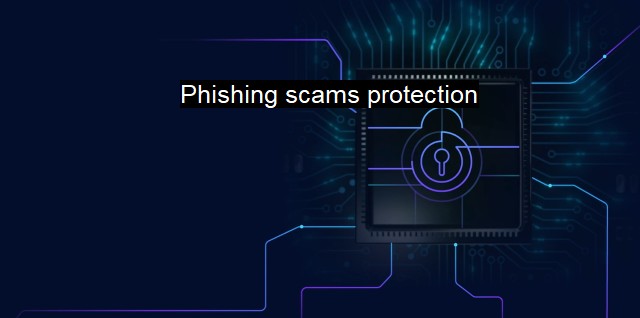What is Phishing scams protection?
Protect Yourself and Your Business from Advanced Phishing Scams: The Critical Importance of Phishing Scams Protection in Today's Evolving Digital Landscape
In the digital world that we inhabit, cybersecurity is a paramount concern. One vivid instance of such concern is the threat posed by "phishing scams" and the consequent need for efficient phishing scams protection. Phishing scams refer to the malicious attempts by cybercriminals to deceive unsuspecting internet users into revealing their sensitive and personal information, such as passwords, credit card numbers, and bank account details.Primarily, these scams occur through fraudulent emails, website replicas, or messages that impersonate legitimate organizations, notably banks or popular online services. It is a bait-and-switch tactic; the term "phishing" analogizes the scammers to fishermen tossing a baited hook into a sea of internet users hoping that someone will bite. From an antivirus and cybersecurity perspective, phishing scams are dangerous predators that pose harmful threats to user's sensitive information and need to be protected against.
To understand how protection for phishing scams works, we must first grasp how these scams operate. Typically, phishing scams start with an attacker sending an email or text pretending to contact a user on behalf of a genuine organization; and when the user, perceiving it as authentic, discloses their private information, the attacker gets hold of it. More sophisticated scams might use fake websites to imitate a real organization's web interface.
Phishing scam protection primarily involves creating awareness and raising digital literacy along with employing technical methods. Individuals and businesses need to be on their toes and should avoid clicking on strange email links, opening suspicious emails, messages, and downloading unverified attachments. Any form of communication that requisitions for personal or financial information should be approached cautiously. Here, internet users not only require the technological shield of antivirus but also the capability to discern and distinguish genuine communications from scams.
Despite awareness being crucial, it is equally vital to have antivirus or cybersecurity systems in place. One effective layer of phishing scam protection includes spam filters, which are software applications that sort and segregate unwanted, risk-laden email spam that may incorporate phishing scams. Further, users can opt for web filters that block access to malicious websites, thereby providing an additional layer of protection.
Apart from these, making use of up-to-date firewall security, continuously scanning the system for threats, conducting frequent software updates, and employing software patches might also help to shield PCs and networks from possible intrusion.
For organizations, implementing multi-factor authentication for system access provides another level of phishing scam protection. This security parameter mandates users to furnish more than a single form of identification before accessing their online accounts.
Leveraging phishing attack simulation and awareness training to prepare an individual or an organization for potential scenarios may bolster their protection to a large extent.
Today, a plethora of security vendors offer cybersecurity solutions against phishing, replete with robust email filtering and threat intelligence. AI is now spearheading a rapid innovation in phishing detection to combat advanced scams that can evade traditional security measures.
Phishing scams protection is not a one-time campaign but an evolutionary state of preparedness. It encompasses creating awareness about scams and the current trends, maintaining the machinery of security measures: antivirus software, firewalls, patches, urging the professional world for two-step verification and employing AI-powered cybersecurity tools.
Phishing scams protection is a little more than having a sophisticated antivirus program, including ongoing vigilance. User awareness along with the deployment of high-tech antivirus software and efficient firewall systems are required as counteractive strategies against such scams. Both individuals and corporations ought to stay straightforward with rules and policies about data security to outsmart cyber villains in their game and sustain a secured cyberworld. The onus remains to evolve, anticipate, prepare and persist in this never-ending journey of cybersecurity.

Phishing scams protection FAQs
What is a phishing scam?
A phishing scam is a type of cyber attack in which an attacker poses as a trustworthy entity to trick a victim into giving away sensitive information such as login credentials or financial data.How can I protect myself from phishing scams?
You can protect yourself from phishing scams by being cautious of emails and messages from unfamiliar sources, verifying the authenticity of links and attachments before clicking on them, and using anti-phishing tools such as antivirus software and browser extensions.What should I do if I fall victim to a phishing scam?
If you fall victim to a phishing scam, immediately change your passwords for all affected accounts and notify the relevant authorities, such as your bank or credit card company. It is also recommended to run a malware scan on your computer to prevent any further damage.Can antivirus software detect phishing scams?
Yes, many antivirus software tools include anti-phishing protection features that can detect and block phishing emails, websites, and other malicious activities. However, it is still important to remain vigilant and practice safe browsing habits to avoid falling victim to phishing scams.| | A | | | B | | | C | | | D | | | E | | | F | | | G | | | H | | | I | | | J | | | K | | | L | | | M | |
| | N | | | O | | | P | | | Q | | | R | | | S | | | T | | | U | | | V | | | W | | | X | | | Y | | | Z | |
| | 1 | | | 2 | | | 3 | | | 4 | | | 7 | | | 8 | | |||||||